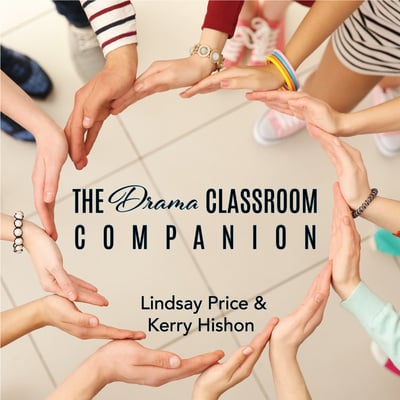Agatha Rex by Lindsay Price is a bold high school take on Antigone - packed with heart, conflict, and a powerhouse ensemble. One girl. One stand. One huge risk. *NEW COMPETITION VERSION AVAILABLE!*
Warm Up Round Table: Warm Ups For Different Types of Plays
Warm-up games are never a throw away activity. They can transition students from the outside world to rehearsal world. They can be used to make your group feel like a team, an ensemble. They can work on the technical skills.
Click the link at the bottom of this post for a 28 page Warm-Up Guide!
Whether you’re rehearsing Shakespeare or devising an original work, there’s a warm-up just for you.
So… what should you look for?
Devised Work
In an original devised play, everyone has to work together to create. And not everything they create is going to be successful the first time out. You want warm-ups where your students say “yes!” Pick warm-ups where students get used to making mistakes and celebrating those mistakes.
Farce
Warm-ups that create energy. You want your students awake and moving! Get students used to making exaggerated physical choices.
Ensemble-based Work
You want your ensemble to operate as one. As a team. Look for warm-ups that emphasize teamwork.
Absurd or Abstract
In the Absurd or Abstract play nothing is naturalistic or realistic. Look for warm-ups that explore this concept. Non-realistic plays can be hard for students to connect to. Choose fun warm-ups to help break down the barrier.
Issue Based Drama
Warm-ups should create an environment of support. Issue-based dramas can open a can of worms for students. It’s important that your rehearsal environment is supportive when unexpected emotions flood to the surface.
Shakespeare
Shakespeare is a mouthful, so prepare the mouth to move! Start rehearsals with warm-ups that focus on vocal articulation.
Comedy
Look for active physical warm-ups that get students laughing. Get your students in the right frame of mind for the work to come.
Drama
Look for listening exercises. Get students used to listening and reacting so that when these moments come up in the drama they will present as genuine. The key to acting in a serious moment is to listen and react and not just say lines by rote.
Student Directors
Student directors need to create an environment of command. Even though they’re working with their peers, they’re still in charge. Look for warm-ups where the cast has to follow instructions. Get the cast used to listening and taking direction.
Related Articles
The Drama Classroom Companion
by Lindsay Price & Kerry Hishon
The Drama Classroom Companion is filled with articles and exercises to build the skills needed for theatrical performance as well as real world skills like creative thinking, critical thinking, collaboration, and communication.
The Rehearsal Companion
by Kerry Hishon
You’ve chosen the play, paid the royalties, done the script analysis, held your auditions, and cast the show. Tomorrow is the first rehearsal. Are you ready? Really ready? The Rehearsal Companion can help!





